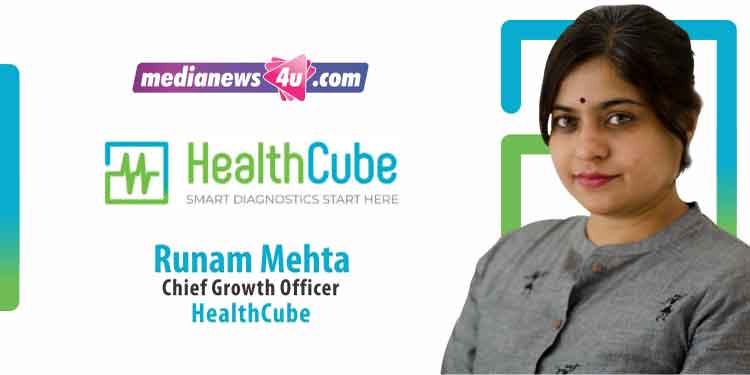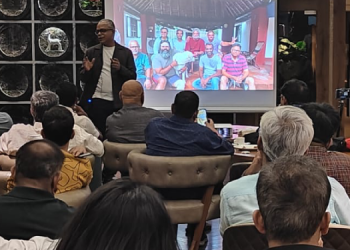HealthCube was founded with a vision of transforming healthcare delivery and making diagnosis hassle-free and straightforward. Its primary product is a medically balanced, technologically sophisticated, handy, portable diagnosis system, similar to a set-top box, that can be used easily anywhere by anyone with minimal training. The system is a combination of intelligent diagnostics and artificial intelligence to facilitate the rapid screening of patients. With this smart solution, HealthCube aims to add value to the services being provided by thousands of healthcare practitioners, especially GPs and frontline health workers. The data collected through HealthCube can be analyzed on customizable parameters and used to track trends in patient acquisition and disease occurrences. HealthCube is an ISO 13485 certified company that has received certification from Central Drugs Standard Control Organization (CDSCO).
In conversation with medianews4u, Runam Mehta, Chief Growth Officer, HealthCube, spoke about challenges faced by the digital health sector during the pandemic, COVIDSAFE – a COVID-19 risk management solution, key trends marketing trends for the Healthcare Industry, and more.
“Our country came to a standstill virtually overnight when the pandemic struck. Without guidelines in place and protocols crystalized, patients who needed regular care were in panic. Suddenly, the brick-and-mortar healthcare structures that we all took for granted were out of reach to the most vulnerable – and I am not even referring to patients suffering from Covid-19. This crisis led to the resurgence of the digital health sector and catapulted the importance of telehealth for routine check-ups and other aspects. This is because, via teleconsultations, physicians can see and evaluate patients without direct exposure. However, the adoption of digital health is also replete with challenges such as uncertainties around policies and legislation. Adding to this is the fact that there is low digital literacy, especially among people living in rural areas and the elderly. Digital health is not just a disruptive innovation but a cultural transformation of a traditional consumer,” said Runam while speaking about the challenges faced by the digital health sector during the pandemic.
Speaking on how diagnostic service providers are becoming one the most critical elements during this pandemic, she said, “The best doctors are even better diagnosticians. COVID-19 has reiterated the importance of diagnostics with the ‘Test, Track & Trace’ mantra that resonated globally. During the pandemic, the diagnostic industry saw a seismic shift in the way it operates. While the shift from traditional laboratories to home sample collections and digital reports had already begun a few years ago, new entrants are increasingly moving toward point-of-care testing, remote patient monitoring, and enabling immediate teleconsultations. Given that more than 70 percent of clinical decisions are dependent on diagnostics tests, organizations providing these services along the value chain will continue to witness growth.”
What are your learnings during the pandemic period?
The pandemic has underscored the need for better public health surveillance, diagnostic capabilities and research to understand the transmission of diseases.
While talking about the learnings during the pandemic period, Runam said, “It has also highlighted the need for all stakeholders and the public to come together in addressing such a massive outbreak. There is only so much that national action can do in preventing transmission. The need of the hour is a coordinated approach between the public and private sectors.
Integration of IoT has been witnessed in the past few months. With public and private funding, this segment is set to grow by leaps and bounds, technological advancements feeding into further growth and creating a virtuous cycle for better access and improved clinical outcomes.”
“Healthtechstartups must continue to look for effective ways using AI/ML to extract value from medical data, reduce the burden on medical staff and predict future outbreaks,” she added.
HealthCube has launched COVIDSAFE – a COVID-19 risk management solution COVIDSAFE uses a proprietary AI-driven algorithm to assess the risk of infection among individuals and aims to minimize COVID-19 exposure and reopen the economy safely. COVIDSAFE is currently being used by Tech Mahindra, Tagros Chemicals, Club Mahindra, NICSI, and Jubilant FoodWorks.
Elaborating on the key marketing trends for the Healthcare Industry in the coming years, Runam said, “The marketing landscape of the healthcare world has changed dramatically in the last year from the outdoor to the realm of the digital and virtual. One of the reasons for this change is the projected three-fold growth to Rs. 8.3 trillion of the industry itself. Intense competition and the need to urgently capture the market share has led to an increase in the marketing budgets from 0.5% of revenues to 7-8% in some cases. With numerous startups entering the segment and the hype around health tech, Data, and AI – the wallet share of the marketing department will continue on this upward trajectory. Thirdly, with improved smartphone and internet penetration, people are increasingly connected and rely on the voice of strangers to decide where to go for their healthcare needs. Unified digital marketing that emphasizes brand positioning and includes search engine optimization, content marketing, and influencer endorsement suddenly becomes crucial for healthcare companies. Suffice it to say, marketing in healthcare just got exciting.
“HealthCube is a B2B health tech brand with a focus on credibility and reliability. Our online marketing strategy, therefore, revolves around reinforcing the expertise of our scientific team. HealthCube’s founder Dr Ramanan Laxminarayan, a renowned economist & epidemiologist, is also a senior research scholar at Princeton University. AS A SCIENTIST AND ENTREPRENEUR, our CSO, Dr Radha Rangarajan, has almost two decades of R&D experience in industry and academia. We rely on our top clients, management, and board of directors to act as our brand ambassadors. We also have a strong digital presence that evolves from the expertise each team member brings to the table,” she said while speaking about the company’s marketing strategies.
Speaking about how HealthCube is innovating the brand as per consumer trends, Runam said, “Innovation is in the integrated nature of our device, in its design and its application – our inside-out approach allows us to use our ecosystem in many ways to serve the rapidly evolving market. For example, during the second wave, we were able to identify and fulfil an exact need that emerged. Our ecosystem has made the Covid wards paperless, eliminating manual errors in recording vitals while enabling doctors to monitor patients remotely. At a time when medical staff is our most precious resource, this latest innovation in the application of our ecosystem has increased nursing efficiency by 30% and improved clinical outcomes.”
She further added,” Home care providers and elder care companies are leveraging our modular devices to monitor their customers regularly and create a longitudinal database which can help them deliver more targeted solutions in the long run. Elders, who are now more conscientious, are now tracking their chronic diseases at home and sharing the data intermittently with their family & caregivers.”
Strategic partnerships with traditional healthcare leaders are key – hospitals, clinic chains and chronic health platforms are all looking to build their digital strategy, and HealthCube is poised to offer them customized solutions and expertise. Telehealth, Senior care, remote care will open up as important segments over 12-18 months.
“In the next three years, HealthCube hopes to capture a significant share of the public and rural primary healthcare market. Several new startups are emerging to set up health ATMs / kiosks, and our technology is a great fit for this upcoming business model set to disrupt traditional diagnostics. Over Rs 3000 Cr of CSR funds is spent every year on healthcare and job creation. Our ecosystem is a good fit for both these kinds of impact projects. We have already empowered 100s of Social Health Entrepreneurs across India in partnership with Vodafone Idea Limited. (Formally known as Idea Cellular Ltd.),” Runam concluded.
HealthCube will find applications and innovative solutions for Big Pharma and Insurance players as we get insights from our extensive data sets over the next 2-3 years.
Finally, we have the clearance to sell in 35+ countries, and we plan to expand our global footprint in the next 2-4 years.

















